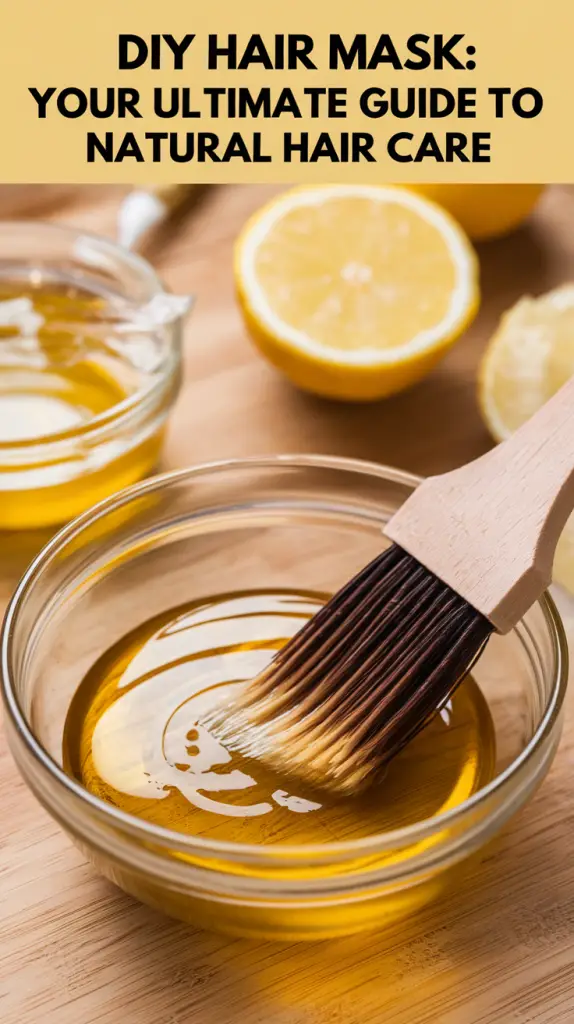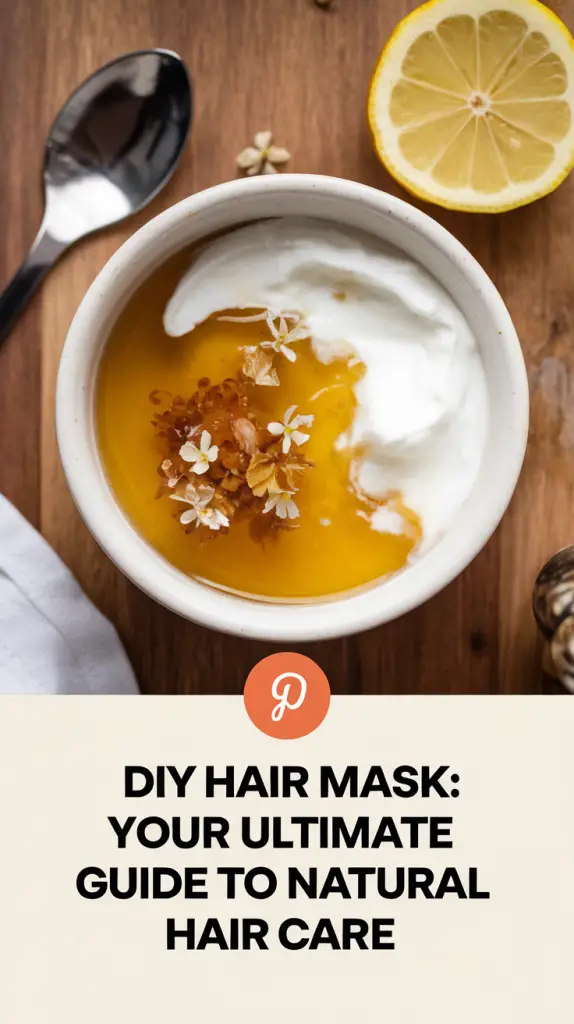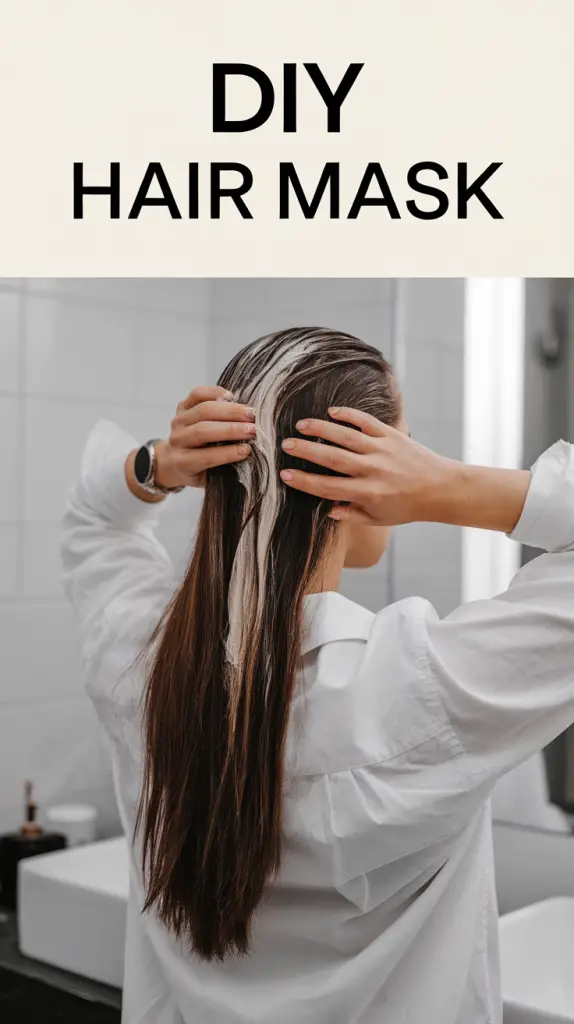DIY Hair Masks: The Ultimate Guide to Natural Hair Care
On my journey to healthier hair, I discovered the wonders of DIY hair masks. There’s something incredibly satisfying about using simple, natural ingredients to create treatments tailored just for your hair. Whether you’re battling dryness, dandruff, or just need a boost of shine, homemade hair masks are a game-changer! Let’s dive into everything you need to know, from recipes to the best tips for achieving silky, luscious locks.

Benefits of DIY Hair Masks
Homemade hair masks offer numerous advantages that make them a favorite for natural hair care enthusiasts like myself.
1. They’re Natural and Chemical-Free
DIY masks let you avoid harsh chemicals, giving your scalp and hair a much-needed break from synthetic additives.
2. Cost-Effective Hair Care
With ingredients like eggs, honey, and avocado often already in your kitchen, you can save significantly compared to store-bought alternatives.
3. Personalized Solutions
Unlike commercial products, DIY masks can be customized to suit your specific hair type and concerns.
How to Prepare for a DIY Hair Mask
Before Applying
- Wash your hair with a gentle shampoo to remove buildup.
- Detangle your hair for even application.
- Select a mask that suits your hair type and current needs.
Application Tips
- Use a wide-tooth comb or your fingers to distribute the mask evenly.
- Cover your hair with a shower cap to retain moisture and heat for better absorption.
- Rinse thoroughly with lukewarm water and follow with conditioner if needed.

DIY Hair Mask Recipes for Every Concern
1. Coconut Oil and Honey Mask for Dry Hair
Ingredients:
- 1 tablespoon coconut oil
- 1 tablespoon honey
Steps:
- Mix the coconut oil and honey in a bowl.
- Heat gently until combined.
- Apply to damp hair, focusing on the ends.
- Leave on for 20 minutes and rinse thoroughly.
Benefits:
This mask hydrates and nourishes dry strands, leaving your hair silky and manageable.
2. Egg and Olive Oil Mask for Damaged Hair
Ingredients:
- 1 egg
- 2 tablespoons olive oil
Steps:
- Beat the egg and mix with olive oil.
- Apply to hair, ensuring roots and ends are covered.
- Let it sit for 30 minutes, then rinse with cool water.
Benefits:
The proteins in the egg repair damage, while olive oil adds moisture and shine.
3. Aloe Vera and Castor Oil Mask for Hair Growth
Ingredients:
- 2 tablespoons aloe vera gel
- 1 tablespoon castor oil
- A few drops of peppermint oil (optional)
Steps:
- Combine all ingredients in a bowl.
- Massage into your scalp and hair roots.
- Leave on for 30 minutes and rinse with shampoo.
Benefits:
This mask stimulates the scalp and promotes healthy hair growth.

Quick Comparison Table: DIY Hair Masks
| Hair Concern | Key Ingredients | Benefits | Application Time |
|---|---|---|---|
| Dry Hair | Coconut Oil, Honey | Hydrates and locks in moisture | 20 minutes |
| Damaged Hair | Egg, Olive Oil | Repairs damage, restores shine | 30 minutes |
| Hair Growth | Aloe Vera, Castor Oil | Stimulates growth, strengthens roots | 30 minutes |
Common Mistakes to Avoid
1. Overusing DIY Masks
Using a mask more than twice a week can weigh down your hair and cause buildup.
2. Using Hot Water with Egg Masks
Always rinse with cool water to avoid “cooking” the egg in your hair.
3. Applying Too Much Oil
Oils can be hard to rinse out if over-applied. Use sparingly for best results.
Post-Treatment Care
After rinsing out your hair mask, consider the following:
- Use a Leave-In Conditioner: To lock in the benefits.
- Air Dry Whenever Possible: Avoid excessive heat styling.
- Detangle Gently: To prevent breakage after treatment.
DIY Hair Mask Recipes for Specific Needs
1. Yogurt and Lemon Mask for Dandruff
Ingredients:
- 3 tablespoons plain yogurt
- 1 tablespoon lemon juice
Steps:
- Mix ingredients and apply to your scalp.
- Leave on for 20 minutes and rinse thoroughly.
Benefits:
This mask soothes the scalp and reduces dandruff with its antifungal properties.
2. Avocado and Banana Mask for Frizz
Ingredients:
- ½ ripe avocado
- 1 ripe banana
- 1 tablespoon almond oil
Steps:
- Mash the avocado and banana.
- Add almond oil and mix until smooth.
- Apply and let sit for 30 minutes before rinsing.
Benefits:
Rich in vitamins, this mask smooths frizz and adds shine.
Comparison Table: Ingredients and Benefits
| Ingredient | Hair Concern | Benefit |
|---|---|---|
| Honey | Dry, damaged hair | Seals in moisture |
| Coconut Oil | Dry, brittle hair | Deep hydration |
| Aloe Vera | Hair loss, dandruff | Soothes and strengthens scalp |
| Egg | Damaged hair | Repairs and nourishes strands |
| Banana | Frizzy hair | Smooths and softens |
Conclusion
Homemade hair masks are an easy and effective way to transform your hair care routine. By using natural ingredients tailored to your specific needs, you can achieve healthy, shiny, and manageable hair without breaking the bank. Try out these recipes and watch your hair thrive. And don’t forget—consistency is key for the best results!
FAQs
1. How often should I use a DIY hair mask?
Once or twice a week, depending on your hair’s condition.
2. Can DIY hair masks be stored?
Most masks should be used fresh, but oil-based recipes can last up to a week in an airtight container.
3. Are DIY hair masks safe for all hair types?
Yes, but always do a patch test to check for allergies.
4. What’s the best mask for oily hair?
Apple cider vinegar and honey masks help balance oil production.
5. Can DIY masks promote hair growth?
Yes, ingredients like castor oil and aloe vera stimulate scalp health and encourage growth.

